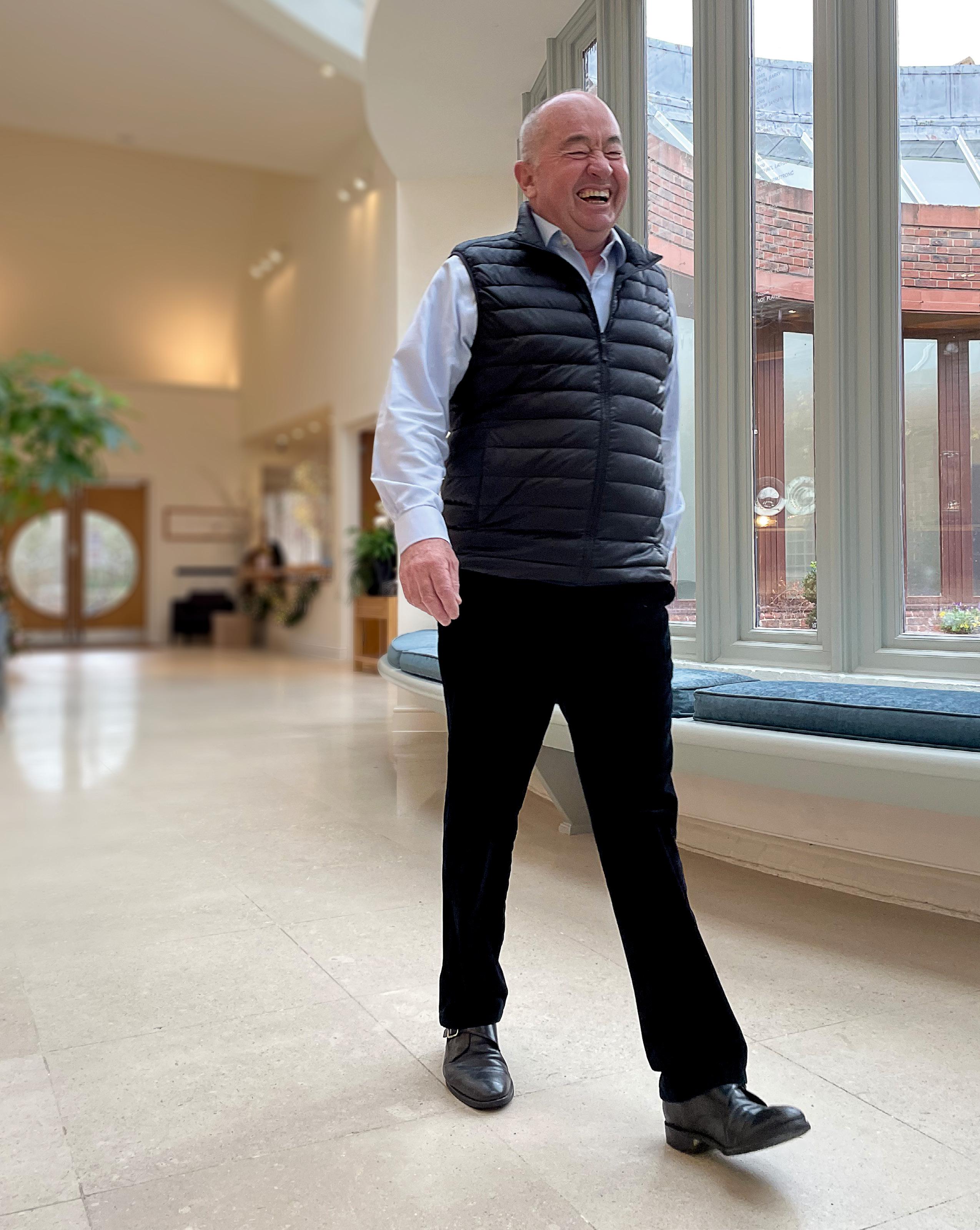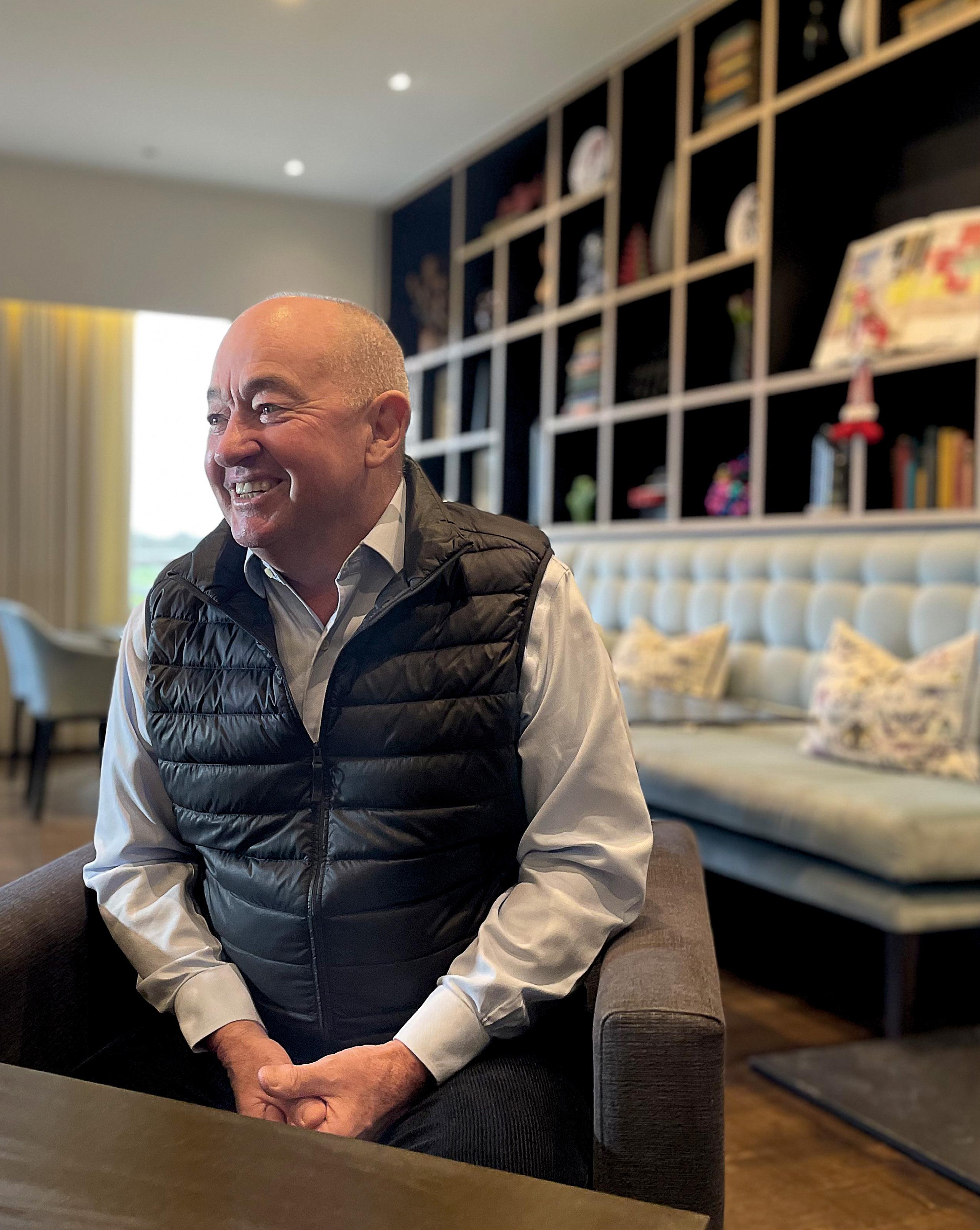
8 minute read
Rebel with a cause Struggling as a player, thriving as a coach. Denis Pugh – the most low-profile, high-profile swing coach in golf
from Upswing 2021
by Upswing
Denis Pugh became a professional golfer at the age of 17 in 1972 and within two years, as a PGA member, was regularly qualifying for events on the European Tour.
REBEL WITH A CAUSE
Advertisement
Words Matt Cooper
When Denis Pugh’s dreams of a playing career were ended in abrupt fashion, another possibility opened up for him; one that took him to the top of the golfing ladder and also allowed him to retain his affection for those who share the love of the game at all levels of the sport.
Time spent with Denis Pugh is a little like playing with a certain kind of toy car, the type you pull back and let fly across the carpet. The difference, perhaps, is that the toy car eventually slows down and stops, whereas Denis Pugh – enthusiast, veteran coach and Vice President of The Wisley – doesn’t. •
The energy and the passion are infectious. A torrent of words, a burst of stories, and a brain that both fizzes with ideas and is alert to new impulses. It’s no surprise that this PGA Master Professional has not only inspired golfers across the entire range of abilities to improve their score but to do so with a smile on their faces.
What may come as a shock is that the kickstart to his successful career was a metaphorical slap in the face, a home truth articulated by the esteemed South African coach Phil Ritson as Pugh struggled to establish himself as a tour player some 40 years ago. “It’s a true story,” Pugh recalls with a chuckle. “He told me straight that I’d never be better than an average player. I was in my mid-20s so it was very hard to hear. Then he told me I could make it to the top as a coach.”
The thunderbolt nature of the first part of the verdict would have broken many, yet Pugh is under no illusions that the honesty made him. Ritson had seen the qualities he had rather than the ones he hoped he had. “Absolutely,” says Pugh. “He saw my passion for the swing, and he also recognised that I get along with many types of people because he always emphasised that, alongside technical skill and up-to-date knowledge, good communication is a major asset in coaching.” •
Once the transition had been made, Pugh embarked on a journey of discovery alongside Ritson and also David Leadbetter, both of whom were early pioneers of video instruction, memories of which prompts more laughter: “It was very radical at the time, but the video recorder back then was the size of a TV camera, and I’d carry it around with a battery that was the size of a suitcase!” to become nightmares for people. I’ve seen how golf can turn a 20-year-old hopeful into a 25-year-old bitter person who hates the game and everyone he met along the way. It’s a tough sport.”
Progress was swift and Pugh began to identify standards that have instructed his work ever since. “Success in anything, but specifically in golf comes firstly, primarily and almost exclusively as a consequence of talent,” he explains, the words tumbling forth. “You polish that talent and they call it work, but it’s more like skill acquisition. The final factor is luck. Everyone who’s been successful at anything will pay respect to the fact that they got lucky at some point and, because of their talent and that skill acquisition, they were able to take advantage.
A variation of the tough talk took place over breakfast at The Wisley in late 2016 with Francesco Molinari. “He was a very, very good European Tour professional,” Pugh says. “But he didn’t want to be that player. He wanted to be the best he could be. That morning we determined what was needed. Cold-blooded, high-risk, chips-on-the-table decisions because there was an acknowledgement that if it didn’t work out, it could be the end of Francesco’s career. Chatting now, I can say how great that journey was, leading to Ryder Cup and Open Championship glory, but I know about the grind, the disappointments and the stepping stones along the way. It’s remarkable that someone in his early “Also, and this is “ I’m an itchy feet person. 30s would be prepared to do that.” absolutely vital, you never grind I never get stuck in any Pugh’s focus stretches a diamond, you polish it. If you area; it keeps me fresh.” beyond the top of the sport. “I’m an itchy feet person. keep grinding a diamond, you’ll end up with I never get stuck in any area; it keeps me diamond dust. That was one of Phil’s two fresh,” he explains. The quest for new ideas rules. The second was more blunt: if you is never-ending and led to some frustrations can’t help someone, don’t muck ‘em up. You in his dealings with the Professional Golf take them into areas where you know that if Association, a period almost defined by the it doesn’t work out, they won’t be ruined.” description of him by former pupil and fivetime European Tour winner Frank Nobilo as Perhaps there was also a third Ritson rule “anti-establishment”. because Pugh never forgot the initial reality check. “I really needed to hear what Phil “I’m a rebel with a cause,” Pugh laughs. “I told me and fortunately, I was willing to instinctively rebel against any rule that doesn’t accept it. But there’s no doubt that one of make sense to me and it’s a really good quality the hardest aspects of coaching is intruding in terms of learning better ways to swing a on the dreams of a younger golfer whose golf club and understanding what happens parents are convinced he’s destined for to the golf ball because before Trackman great things when it simply isn’t going to technology, there was so much happen. It’s brutal, but I don’t want dreams
Denis was Head Professional at The Wisley from January 2000 for almost 10 years.

rubbish talked about what happens to ball flight. Knowing that, I was quite rebellious with the PGA in the 90s, yet, a few years later, I co-authored the PGA manual. So, I’m a rebel, but I’m also an establishment supporter because it should have rules that make sense instead of nonsensical ones. I’m not into chaos!” potential to improve. Together with Paul Lyons, he co-founded The Golf College to help youngsters’ progress into the industry and one day set them question. “I asked: ‘If, for the rest of your life, you can consistently shoot 72 or you shoot average 72, which means you’ll have days when you shoot 82 and others when you shoot 62, which do you


Denis Pugh has been a regular and well-respected pundit for Sky Sports’ golf coverage for more than 20 years.
To mention golf’s dress rules is to witness Pugh’s belief in golfing egalitarianism in full flight. “The Wisley gets it!” he cries. “But some places? Well ... The funny thing is that I couldn’t be more conservative in what I wear, I don’t even own a pair of jeans, so it’s not self-serving! What matters to me is that someone wants to play the game in the right spirit!”
Appreciation of golf’s soul matters to Pugh; it fuels his time spent with amateurs. “There are Wisley members I play with who will never play better than a 20-handicap, but they have an absolute passion for the game,” he says. “The prowess of a golfer is not necessarily the most important measure, it’s increasing their enjoyment of the game.”
Which is not to say Pugh doesn’t demand fire in the belly, especially from those with choose?’ It horrified me that 20-year-old kids playing off four or five took 72 every day of their life. It’s actually one of the saddest things I’ve ever heard. In terms of making a living from the sport, you’ll never be any good with that attitude. Never.
“It’s a vital mindset. Never be so scared to play badly that you won’t take a risk. Fear of failure is a great motivator, but you should never avoid placing yourself in a position where you might lose. That applies at every level. A lot of club golfers are like that. I ask: ‘What are you going to lose?’ A 20-handicapper might be afraid of becoming 30, rather than excited by becoming ten.”
Disabled golfer George Groves possessed the right mindset. He progressed his game to scratch whilst at college and has since topped the disabled world rankings. Born with limited movement in his joints and muscles, his left arm had little function, a situation at odds with the traditional swing and a challenge Pugh relished. “We effectively rewrote the book for him,” he reveals. “It was a case of – let’s find a way. It wasn’t just me, we had a team who developed a swing that maximised what George had and by the end, he was hitting like a pro.”
What of the future for the sport he loves so much? “Twenty years ago, I wrote in the PGA manual that there are three requirements for an elite golfer to reach the top: power, power and power. That was a prediction in the Tiger era, and it is still true today. The game is clearly getting longer. Some blame the ball or the driver technology, but undeniably we see golfers change physically. We now have athletes playing the game. Is it good for the game? I’m not sure. Golfers will arguably have a similar physique – more like we see in basketball, rather than the chess players of the past.”
If it seems a glum assessment to end on, Pugh cannot stop himself adding: “If you give me a power player with the capacity to acquire skills, that’s the future.” See what happened there? He’s always thinking, even when dealt a hard truth. The words still spill forth, the feet still itch, the brain still fizzes – the Pugh passion undimmed.











